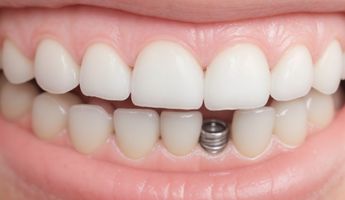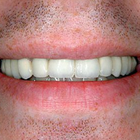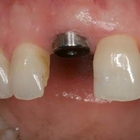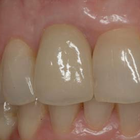Dental Implant in Hong Kong
Search and Compare the Best Clinics and Doctors at the Lowest Prices for Dental Implant in Hong Kong

Find the best clinics for Dental Implant in Hong Kong
No pricing info available
Vietnam offers the best prices Worldwide
Price: $ 1
From 42 verified reviews
Jerry Yip, 11 November 2019
Beautiful environment, quiet enough
From 96 verified reviews
x Crxzy, 16 September 2020
Very unique hospital.
- Home
- Hong Kong
Compare Before & After Photos of _procedure_photos.phpDental Implant


Front view


Front view


Front view


Front view


Front view
WHY US?
At Medijump, we're making medical easy. You can search, compare, discuss, and book your medical all in one place. We open the door to the best medical providers worldwide, saving you time and energy along the way, and it's all for FREE, no hidden fees, and no price markups guaranteed. So what are you waiting for?

Free

Best Price

Widest Selection

Risk-Free
What you need to know about Dental Implant in Hong Kong

A dental implant is a medical device that provide support to artificial teeth. It's surgically placed into the jaw to act as a replacement for the root of a missing or damaged tooth, which in turn serves to hold a replacement tooth or bridge. It functions and looks much like a real tooth, restoring your ability to chew and improves your overall appearance. Dental implant surgery is considered as a better alternative to dentures or bridgework that does not fit well. It also offers a great option for people when they do not have enough natural teeth roots left to build denture or bridgework replacements.
Since dental implants eventually fuse with your jawbone over the span of several months, it won’t make noise, slip, or cause bone damage the way dentures or bridgework might. Dental implants also enable natural speech, look and feel like your own teeth, make eating easier, and improves your appearance. However, the surgery may involve several stages, and, in some cases, it may require two separate visits to the clinic to complete. Ensure to look for a specialist in a reputable clinic for the best results.
What is the cost of Dental Implant in Hong Kong?
Price differences abound in Hong Kong for Dental Implant based on the clinic, the proficiency of the surgeon, and the individual requirements of the patients. It's essential to realize that dental insurance usually doesn't cover the entire bill for this treatment, though it might cover a part. Several dental clinics provide finance schemes or payment alternatives to assist in easing the financial burden. For more precise cost estimates, reach out to your dental service provider or a nearby clinic.
What does a Dental Implant Procedure Involve?
Dental implant surgery generally requires several stages. Each stage may be performed under general or local anesthetic. The first stage is removing the damaged tooth. Then, if your jawbone is too soft or not thick enough, your dentist may perform bone grafting to create a more solid base for the implant. The bone graft may be natural (taken from another part of your body) or synthetic (a bone-substitute material). If you only need minor bone grafting, the implant surgery can be performed on the same day. However, if you need a significant amount of bone graft, the implant surgery may have to be postponed until the transplanted bone grows enough new bone to support the dental implant.
The next stage after the damaged tooth removal and bone graft (if you need one) is placing the dental implant. To do this, your dentist makes an incision to expose the bone and puts the metal implant post deep into the bone. At this stage, you will still have a gap where your tooth is missing. Your dentist will place a temporary denture for appearance. Once the metal implant post is placed, osseointegration begins. This is a process where the jawbone grows into the surface of the implant and can take several months to complete. After osseointegration is complete, your dentist will place the abutment, which is a small connector post that will hold your new tooth. The final stage, after the abutment is placed, is placing the crown, which is the tooth-looking part. You can choose between a removable crown and a fixed crown.
How Long Should I Stay in Hong Kong for a Dental Implant Procedure?
The length of your stay in Hong Kong for a Dental Implant depends on numerous considerations like the intricacies of the procedure, the quantity of implants required, and your personal recovery process. Each stage of dental implant surgery is done in separate appointments. After each appointment, you should be able to leave the hospital or clinic right away. However, you should stay in Hong Kong for at least 2 weeks for completion of the work, the initial recovery time, and follow-up checkups.
What's the Recovery Time for Dental Implant Procedures?
The recuperation duration following a Dental Implant or dental implant operation can widely vary and is shaped by multiple aspects. Initial healing of the tissue might require only a handful of days, but complete osseointegration (the fusion of the implant with the jawbone) generally spans several months. This window could be extended for patients requiring auxiliary procedures such as bone grafts, or those with prevailing health issues that may impede the healing process.
Post-procedure, it's not unusual to experience a degree of discomfort, which could manifest as minor pain, swelling of your gums and face, skin and gum bruising, and slight bleeding. Such symptoms are a standard phase of the recovery process and should alleviate within a fortnight. In this interim, it's advisable to stick to a soft diet to not overload the implant site with undue pressure. Any strenuous physical exertion should be put off to circumvent potential complications.
Maintaining excellent oral hygiene is paramount to facilitate healing and stave off infection. Regular brushing and flossing, being particularly gentle around the surgical area, coupled with rinsing your oral cavity with warm saline water, can contribute to keeping the region hygienic.
What sort of Aftercare is Required for Dental Implant Procedures?
After each stage of surgery, you may have to eat soft foods. Since you may experience swelling, bruising, pain, and minor bleeding, your dentist will prescribe pain medications or antibiotics to help ease your discomfort. During your recovery period, you need to avoid smoking as it can contribute to implant failure and complications.
No special care is required for dental implants. Nonetheless, you need to practice good oral hygiene in order to maintain the implant and your remaining natural teeth. Make sure to brush your teeth twice a day, floss daily, and rinse your mouth with an antiseptic mouthwash. You also need to see your dentist regularly and avoid damaging habits, such as chewing hard items.
What's the Success Rate of Dental Implant Procedures?
The efficacy of Dental Implant, alternatively referred to as dental implants, in Hong Kong, is typically impressive, boasting effectiveness percentages as high as 98% in some studies. This positions dental implants as one of the most reliable procedures within dental care's realm. Nevertheless, it's worth mentioning that the success rates might fluctuate, influenced by several factors.
The patient's overall health is a key determinant of the thriving outcome of a dental implant procedure. Individuals exhibiting optimal health usually witness higher success rates. Pre-existing health issues like diabetes, osteoporosis, and periodontal ailments can theoretically impact the efficacy of the implant.
Additional contributing factors to the success rate encompass the quality and abundance of the individual's bone structure. Patients boasting plentiful, healthy bone are ordinarily the perfect candidates for dental implants. However, those who have experienced bone loss might need to undergo a bone grafting procedure before the implant procedure. This step can provide a robust base for the implant and enhance the chances of a successful result.
Are there Alternatives to Dental Implant Procedures?
If you are not a candidate for dental implant surgery, or you simply do not want to undergo the procedure, you can opt for the alternatives. The alternatives include:
- Mini dental implants, which is a small type of dental implants. The structure is similar to regular dental implants, but are somewhat smaller in size. Unlike regular dental implants, dentists can often place mini implants only in one visit using local anesthesia. You may also be able to use your new teeth on the same day.
- A same-day implant is essentially similar to traditional dental implants. However, your dentist performs the whole process in just one day, skipping the process of wound healing and osseointegration.
- Implant-supported dentures or All-on-4 is an alternative if you need to fix a complete upper or lower set of teeth. During this procedure, four to six implants are placed into your jawbone as a base to attach and stabilize your denture.
What Should You Expect Before and After the Dental Implant Procedure?
Grasping what lies ahead before and post the Dental Implant can lessen potential worries and guarantee you are fully equipped for the upcoming journey. Prior to the procedure, your dental practitioner will conduct an all-inclusive dental assessment. This check-up may encompass dental X-rays and sophisticated 3D imaging to examine the status of your oral cavity.
The dental professional will also explore your medical history. If you're suffering from specific heart disorders or orthopedic implants, your dental practitioner might suggest antibiotics to avert infection. A personalized treatment blueprint, customized to your circumstances, will be constructed. This strategy takes into account factors like the amount of teeth you need substituted and the state of your jawbone. The procedure is typically carried out under local anesthesia to mitigate any discomfort.
Subsequent to the operation, experiencing slight unease is usual. You might witness inflammation of your face and gums, discoloration of your skin and gums, soreness at the insertion area, and insignificant bleeding. Your dental specialist will recommend medications to soothe these indicators. In case inflation, unease, or any other complications intensify in the days post-operation, it's crucial to reach out to your oral surgeon. Post-operation will require you to consume mushy foods as the operated site recovers. Moreover, you'll be guided to abstain from smoking, as it can hinder recovery and influence the triumph of the dental implant.
Following the positioning of the implant, the healing process, and fusion with the bone (osseointegration) transpire over an extended period. During this interval, maintaining robust oral cleanliness is vital. This involves frequent brushing, the use of dental floss, and cleansing with an antibacterial mouthwash. Periodic dental examinations are obligatory to track progress and confirm the well-being and effectiveness of the implant.
What are Potential Risks of Dental Implant?
Despite Dental Implant boasting remarkable effectiveness, it is, as any surgical operation, not without risks and potential difficulties. The chances of encountering these issues are often minute and irregularities are infrequent, yet it remains critical for patients to comprehend these possibilities before undertaking the procedure.
Complications and side effects may include:
- Implant failure
- Nerve injury
- Infection
- Sinus problems
- Damage to surrounding structures, such as other teeth or blood vessels
How long does a Dental Implant last?
The durability of a Dental Implant is heavily reliant on the individual's oral cleanliness and general wellbeing. Nonetheless, with appropriate upkeep and care, dental implants have the potential to stand the test of time. The titanium pillar inserted into the jawbone during surgery is crafted to be everlasting, while the dental cap fastened to the anchor may necessitate substitution every decade or decade and a half due to normal usage. Yet, with outstanding dental management and habitual screenings, the cap has the potential for lifelong endurance.
Whilst the information presented here has been accurately sourced and verified by a medical professional for its accuracy, it is still advised to consult with your doctor before pursuing a medical treatment at one of the listed medical providers
No Time?
Tell us what you're looking for and we'll reachout to the top clinics all at once
Enquire Now

Popular Procedures in Hong Kong
Prices Start From $1

Prices Start From $1

Prices Start From $48

Prices Start From $1

Prices Start From $1

Prices Start From $11

Prices Start From $1

Prices Start From $45

Recommended Medical Centers in Hong Kong for Dental Implant

- Interpreter services
- Translation service
- Religious facilities
- Medical records transfer
- Medical travel insurance
- Health insurance coordination
- TV in the room
- Safe in the room
- Phone in the room
- Private rooms for patients available

- Interpreter services
- Translation service
- Religious facilities
- Medical records transfer
- Medical travel insurance
- Health insurance coordination
- TV in the room
- Safe in the room
- Phone in the room
- Private rooms for patients available

- Interpreter services
- Translation service
- Religious facilities
- Medical records transfer
- Medical travel insurance
- Health insurance coordination
- TV in the room
- Safe in the room
- Phone in the room
- Private rooms for patients available

- Interpreter services
- Translation service
- Religious facilities
- Medical records transfer
- Medical travel insurance
- Health insurance coordination
- TV in the room
- Safe in the room
- Phone in the room
- Private rooms for patients available

- Interpreter services
- Translation service
- Religious facilities
- Medical records transfer
- Medical travel insurance
- Health insurance coordination
- TV in the room
- Safe in the room
- Phone in the room
- Private rooms for patients available

- Interpreter services
- Translation service
- Religious facilities
- Medical records transfer
- Medical travel insurance
- Health insurance coordination
- TV in the room
- Safe in the room
- Phone in the room
- Private rooms for patients available

- Interpreter services
- Translation service
- Religious facilities
- Medical records transfer
- Medical travel insurance
- Health insurance coordination
- TV in the room
- Safe in the room
- Phone in the room
- Private rooms for patients available

- Interpreter services
- Translation service
- Religious facilities
- Medical records transfer
- Medical travel insurance
- Health insurance coordination
- TV in the room
- Safe in the room
- Phone in the room
- Private rooms for patients available
Dental Implant in and around Hong Kong
About Hong Kong
The former British colony became a special administrative region of China in 1997, when Britain's 99-year lease of the New Territories, north of Hong Kong Island, expired. Hong Kong is governed under the principle of "one country, two systems", under which China has agreed to give the region a high degree of autonomy and to preserve its economic and social systems for 50 years from the date of the handover.
Hong Kong welcomes an ever-increasing number of medical tourists each year, many of which travel for Dental Implant procedures. Hong Kong is a well-established hub for medical tourism, although it is better known for its quality and cutting-edge procedures than for cost.
Popular Parts of Hong Kong
Hong Kong is a blend of a dynamic cultural landscape with an astonishing skyline, glamorous shopping, as well as one of the world’s top culinary destinations.
- Victoria Peak (The Peak) offers the best view of Hong Kong’s modern skyline. It is the highest point on Hong Kong Island and the most visited spots by tourists. You can ride the tram to the top where you will find the Peak Tower and Peak Galleria. The peak is covered by a large park filled with incredible greenery.
- Big Buddha (Tian Tan Buddha Statue) is located in Lantau Island. It is one of the largest Buddha statues and took 12 years to complete. It is the perfect place for tourists who wish to get away from the hustle and bustle of the city. Surrounded by forest and ocean, the statue gives an incredible view. The best way to reach the Buddha is by riding the Ngong Ping Cable car which will take you on a spectacular ride over the forest.
- Wong Tai Sin Temple is one of the most popular temples in Hong Kong. It was named after the famous monk of yore, Wong Tai Sin. It is said that he has the ability to punish evils, heal the wounded, rescue the dying, and grant whatever is requested. The temple is also known as Sik Sik Yuen and has a traditional Chinese temple style.
- Temple Street Night Market is the best night market for tourists. Starting at 6.00 pm, it is the place to go if you want to taste Hong Kong’s street food. You can also find vendors selling gadgets, trinkets, clothing, household goods, jewelry, and traditional Chinese crafts. The place is brimming with atmosphere and it has served as the backdrop to many movies.
- Hong Kong Disneyland is a wonderful world for any Disney lovers. The park is divided into seven lands: Adventureland, Grizzly Gulch, Main Street, Mystic Point, Fantasy Land, Toy Story Land, and Tomorrowland. Here, you will find various adventures, parades, and musicals. In the evening, you can watch the fireworks over the castle.
- Star Ferry is a beloved icon of the city. It is said that your visit to Hong Kong will never be complete without cruising on the famous ferry. You can see the sparkling landscape of the city while enjoying the refreshing breeze.
Weather and Climate in Hong Kong
Hong Kong’s weather is influenced by the monsoon subtropical climate. The temperature is mostly mild all year round. May to September are the warmest months with an average temperature of 33 °C while mid-December to February are the coldest months with the temperature falling to 10 °C. Spring starts from March and ends in early May and the weather during this season is pleasant with many sunny days, but you can also have foggy, rainy, and stormy days.
The summer in Hong Kong is hot and humid with a perpetual threat of rain showers, thunderstorms, and sometimes even typhoons. Summer lasts for around four months from May to September. With August as the wettest month in the city.
The best time to visit Hong Kong is in the autumn, starting from October to early December when the days are generally sunny and the temperatures range from 22 °C to 28 °C. Winter is the holiday season in the city and the average temperature is around 16 °C to 18 °C but it can drop under 10 °C.
Getting Around in Hong Kong
The main gateway to Hong Kong is the Hong Kong International Airport. The airport is built on reclaimed land on the island of Chek Lap Kok and it serves international destinations to almost every major city in the world, including, Dubai, Amsterdam, Seoul, Canada, Singapore, and Sydney. For affordable travel, budget airlines such as AirAsia, Eastar Jet, and IndiGo are available. There are a wide variety of public transport services to and from the airport. The best options are Airport Express, public buses, and taxis.
To get around Hong Kong, it is best to purchase Tourist Day Tickets which gives you unlimited access to the main MTR and certain Rail lines for HK$65. If you are planning to stay longer in the city, the Octopus Card will be a big help. The card is reusable and can be used for almost every public transportation mode and you can buy the card for HK$150.
One of the fastest and easiest ways to get around the city is by the MTR (Mass Transit Railways) and it is one of the most advanced metro systems on the planet. The MTR operates 11 lines from 06.00 am to 01.00 am. The fare ranges from HK$3.6 to HK$52.6 depending on the distance.
The public bus is a great way to explore Hong Kong, especially the south side of the island and the New Territories. Most buses are double-decker and air-conditioned and it is an affordable way to get around the city and the fares will vary based on the distance traveled. Other public transportation modes such as tram and ferry are also available.
If you need a more flexible way of travel, taxis are easy to find and offer excellent value. There are three types of taxis, the red taxis operate throughout the city except for Lantau Island and the fares start at HK$24. The green taxis only operate in the New Territories and the fares start at HK$20.50. The blue taxis serve Lantau Island and the fares start at HK$19.
Tourist Visas in Hong Kong
Citizens of around 170 countries and territories may visit and stay in Hong Kong without a visa for up to 180 days. Other countries not listed in the visa-free entry such as Albania, Armenia, and Cambodia need to apply and obtain a visa before entering the country. All visitors must have a passport valid for at least one to six months beyond the date of entry to Hong Kong. Visitors can apply for a visa from their nearest Chinese embassy or consulate.
Additional Information
- Local Currency: The official currency is the Hong Kong Dollar. US$1 converts to HK$7.78.
- Money & Payments: Tourists can find ATMs almost everywhere, and most ATMs are linked up to international money systems such as Maestro, Cirrus, and Visa Electron. Credit cards are widely accepted. Tipping is generally not expected and restaurants usually add 10% to 15% service charge to your bill.
- Local Language: Most people in Hong Kong speak Chinese (Cantonese and Mandarin). However, English is also widely spoken since it is one of the government official languages.
- Local Culture and Religion: Many people in Hong Kong either follow Buddhism, Confucianism, or Taoism. Christianity is also one of the major religions in the city. Other religions such as Islam, Sikhism, Hinduism, Judaism, and the Bahá'í Faith are also freely practiced.
- Public Holidays: Hong Kong celebrates major religious holidays such as Lunar New Year, Ching Ming Festival, and Christmas.
Popular Searches
- Plastic Surgery in Thailand
- Dental Implants in Thailand
- Hair Transplant in Thailand
- Breast Augmentation Thailand
- Gastric Sleeve in Thailand
- Gender Reassignment Surgery in Thailand
- Laser Hair Removal in Bangkok
- Botox in Bangkok
- Dermatology in Bangkok
- Breast Augmentation in Bangkok
- Coolsculpting in Bangkok
- Veneers in Turkey
- Hair Transplant in Turkey
- Rhinoplasty in Turkey
- Stem Cell Therapy in Mexico
- Rhinoplasty in Mexico
- Liposuction in Mexico
- Coolsculpting in Tijuana
- Rhinoplasty in Korea
- Scar Removal in Korea
- Gastric Sleeve in Turkey
- Bone Marrow Transplant in India
- Invisalign in Malaysia
- Plastic Surgery in the Dominican Republic
- Tummy Tuck in the Dominican Republic
- Plastic and Cosmetic Surgery in Poland
- Rhinoplasty in Poland
- Hair Implant in Poland
- Dental Implants in Poland
- IVF in Turkey

